-
Understanding Your Company’s Carbon Footprint
If you recently acquired recycling bins in Atlanta for your business, then you’re probably interested in fostering a green business and reducing your environmental impact. Continue reading to learn about your company’s carbon footprint.

What is a carbon footprint?
A simple way to think of your company’s carbon footprint is the sum of everything it does that impacts climate change. In many cases, a carbon footprint is calculated by creating an estimate of the total CO2 and other greenhouse gas emissions produced by your company’s operation. Once the numbers are added up, they are expressed as in what’s called a carbon dioxide equivalent, which represents how much CO2 would cause the same amount of warming.
How is a carbon footprint calculated?
To gain an understanding of where your company currently stands as far as its carbon footprint is concerned, you can hire an expert to come in and perform an assessment. To gather the information needed for calculating your business’s carbon footprint, the evaluator will add up as many emissions pathways as is feasible. Some examples of pathways include how much power is required to run your buildings each day, the amount of transportation needed for shipping products to or from your company, and the level of emissions generated by cooling or heating your business.
How can I reduce my company’s carbon footprint?
To make a dent in your company’s carbon footprint, start by having it calculated, so you know what areas to address. Also, setting up a recycling system is one of the simplest ways in which you can reduce your company’s negative impact on the environment. By placing metal, plastic, and cardboard recycling bins in your office or building, you can implement better waste management practices in a way that’s easy to use and maintain. A few other methods to consider are upgrading your company’s light bulbs to LEDs, encouraging working from home for employees, and getting your team in the habit of turning off electronics and lights when they aren’t in use.
-
How Plastic Bottles Are Recycled
Recycling systems offer business owners a simple and smart way to reduce their company’s operational costs and carbon footprint. Does your business practice plastic recycling near Atlanta ? If so, then watch this video to get a glimpse of how this material is recycled.
Once the plastic reaches the recycling facility, it is first run through a shredder, which helps release any liquid left behind in plastic bottles. Then, the shredded pieces are packaged and shipped around the world. While plastic recycling is frequently used to make more plastic bottles, it can also be part of the process for creating polyester.
-
Types of Non-Hazardous Industrial Waste
Having an effective and efficient recycling and waste disposal system is important for any business. If your company is part of an industry that produces waste, then understanding which materials are hazardous and which are not can be essential for developing a resourceful waste management program. If you regularly deal with industrial waste near Atlanta , then continue reading to learn about which materials are considered non-hazardous.
Non-hazardous industrial waste falls into several classifications. Class 1 wastes can be potentially threatening to the environment and human health, and examples of these include liquids that can ignite at temperatures exceeding 150 Fº and soils that are contaminated with petroleum hydrocarbons. Class 2 wastes are typically accepted at local landfills and can include items like non-radioactive non-surgical medical waste and depleted aerosol cans. Finally, Class 3 wastes do not decompose or react with other materials, and they are also insoluble. A few examples of Class 3 wastes are glass, rocks, bricks, and some plastics.
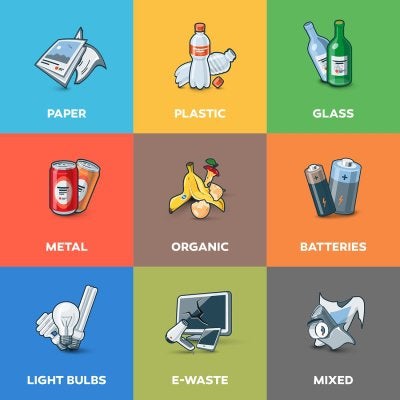
-
The Impact of the Recycling Industry
When you toss a used soda can into a recycling bin for aluminum materials, you may not give much thought to where it goes after or what type of impact that simple action can have. Watch this video to learn how recycling your waste near Atlanta impacts society and the environment.
For over 200 years, the recycling industry has provided countless benefits for the environment and the economy. When you place your recyclable waste into a recycling bin, it is processed and converted into a clean, high-quality product. This means that new items can be created with much less environmental impact. Also, in the United States alone, this industry directly employs more than 140,000 people, making it incredibly beneficial to the economy.
-
Up Close with the Waste Management Needs of a Grocery Store
Grocery stores are responsible for the contents of most Americans’ pantries. They’re the all-important conduit between farmers and consumers. Part of running a successful grocery store is making sure all waste needs are taken care of; after all, no one wants to shop at a grocery store with an overflowing dumpster nearby. Here’s a look at the average grocery store’s waste management needs and how those needs can be satisfied by waste disposal experts in Atlanta .
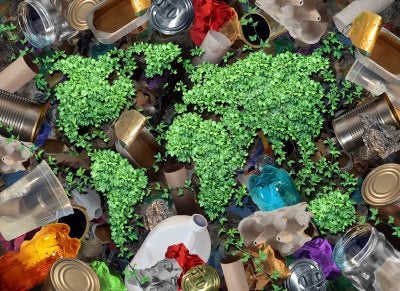
Packaging
Grocery stores have thousands, if not millions, of units of product delivered every year. Whether these products are from down the street or across the ocean, they need to be properly packaged to prevent damage or contamination. Once these products arrive, it’s the grocery store’s responsibility to remove and discard the packaging in a responsible manner. Fortunately, most product packaging these days is recyclable, making it relatively easy to dispose of in an environmentally friendly way.
Food Waste
In an ideal world, the average grocery store would sell all of its perishable food products before they rot or expire. In the real world, however, grocery stores need to find a way to dispose of any fruits, vegetables, meats, and dairy products that don’t sell quickly enough. Some grocery stores partner with local food banks, which then deliver the food to people in need. Whatever’s left is picked up by a waste management company and delivered to a place where it can be composted.
Renovations
Whether it’s decorating for a new season, altering the layout, or renovating, grocery stores frequently undergo changes to stay competitive. When it comes to this kind of change, the average grocery store is inevitably going to produce some waste. Renting a roll-off dumpster for the duration of these change can help simplify waste management. Once the project is over, a waste management firm can pick up the dumpster and properly dispose of the waste therein.
-
Waste Management in a Senior Living Community
Like any other residential community, senior living communities must take measures to ensure that their waste management needs are met. That said, senior communities have unique considerations that can only be addressed by a select few waste management companies in Atlanta. If you are in charge of handling waste disposal for a senior living community, think about the following factors when settling on a waste management company.
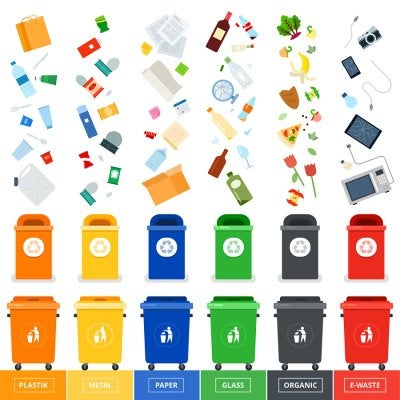
Garbage and Recycling
Dealing with day-to-day garbage is the most obvious waste management consideration for any community. Working with garbage specialists to estimate your community’s average garbage output is an important first step in determining how much dumpster space you need. Don’t forget the importance of recycling—there’s a good change that your staff and residents are throwing away items that can be recycled. Having a waste management company help with recycling can keep recyclable and compostable materials out of landfills.
Biological Waste
Senior living communities tend to have different medical needs than other communities. Some senior communities have a nursing staff to make sure seniors receive the healthcare they need to stay happy and healthy. Administering healthcare in such an environment often produces biological waste that can’t be disposed of in a normal manner. As the manager of a senior living community, you’ll need to find a company that’s qualified and equipped to handle certain types of biological waste.
Medication Disposal
Senior living communities are often targeted by criminals looking for prescription drugs. Not only can this put the members of your senior living community at risk, but it’s harmful to the surrounding community as well. It’s definitely a good idea to work with a waste management company in Atlanta to ensure that your dumpsters are properly secured, or else settle on an alternative method of disposing of medications. Enacting secure waste management practices can keep would-be criminals out of your community and your residents safe.
-
Reasons to Work with Southern Waste & Recycling
Every business produces waste at one point or another. As your business weighs its waste management needs, you should find a recycling company in Atlanta that offers the right services with the right attitude. Southern Waste & Recycling has years of experience providing our Atlanta clients with a wide range of waste management services, including roll-off dumpsters, industrial waste management, junk removal, and more.
At Southern Waste & Recycling, we provide transparent and professional service. We comply with all state and local guidelines, and all our waste management professionals have received the proper training. We also work hard to execute our clients’ day-to-day requirements and help streamline their logistics as much as possible. Throughout the project, our team members provide analytical data and reporting; and once the project is done, we offer our clients simplified and consolidated invoicing. When you work with us, we will ensure that all of your waste management needs are met, and we’ll do it with a smile on our face.
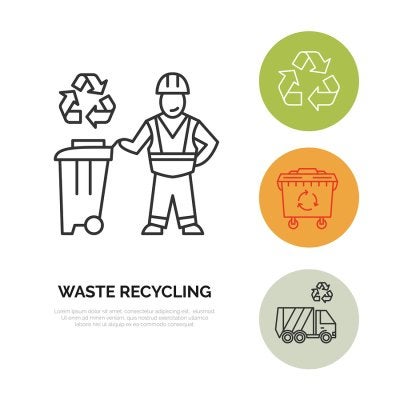
-
A Look at Different Types of Industrial Waste
Businesses and consumers all over the country depend on industrial plants to do the heavy lifting involved with production and manufacturing. As you can imagine, manufacturing plants produce a large amount of waste that has to go somewhere. Industries have the added challenge of ensuring that their waste doesn’t contaminate the surrounding environment. Here’s a quick look at the types of industrial waste that a waste management company in Atlanta may end up handling.
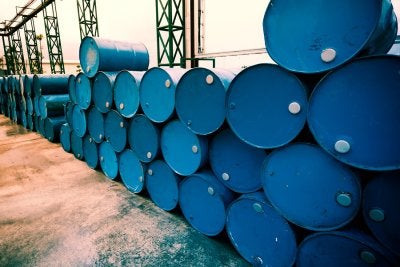
Recyclable Materials
Much of the waste produced or received by industries can be recycled. The trick is to determine exactly which items can be recycled and make sure they make it to the appropriate facilities. For instance, an industrial plant may receive thousands of boxes full of materials necessary for production. Once the contents of those boxes are removed, the boxes themselves can be recycled.
Non-Recyclable Waste
Of course, not everything can be recycled. There are many items that will need to be picked up by a waste management company and delivered to a landfill, or else reused in a more creative manner. Working with waste experts to identify the proper disposal methods for certain materials can help ensure that your plant is in compliance with the law.
Manufacturing Byproducts
Manufacturing plants are hard at work every day producing products that are shipped around the world. As you can imagine, there are also plenty of byproducts left on the facility floor. Much of the time these byproducts can be collected and reused for other industrial purposes—other times they need to be recycled or otherwise disposed of.
Hazardous Waste
Manufacturing millions of units of product can be messy business. Many industries rely on hazardous materials to create their products in a manner that is consistent with consumer expectations. However, these industries are responsible for ensuring that any hazardous materials are disposed of properly, both for the sake of their employees and the surrounding environment.
-
Why Should Your Business Use a Baler?
Space is a constant concern among business owners. For many, the availability of space allows for the storage more merchandise, which can translate to higher sales. If your storeroom or warehouse is full of paper, cardboard, and other forms of waste, then you probably don’t have enough space for merchandise and other useful items. By renting a baler from a waste management company in Atlanta, you can break down your waste into compact bales and free up more space for your business.
There are a number of other benefits that come with renting a baler. For one, consolidating your waste can reduce the total number of waste disposal trips you make and help bring down the costs associated with waste. Under some circumstances, you may even be able to turn your recycling efforts into a whole new revenue stream. There are many businesses that can benefit from a baler, including distribution centers, department stores, office complexes, supermarkets, and large restaurants. If you have a lot of cardboard or paper that you’re not sure what to do with, talk to a waste management company near you about renting a baler.
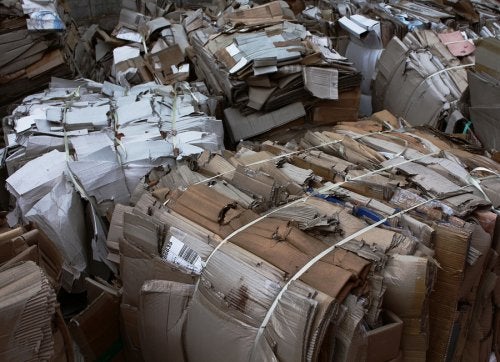
-
The Glass Recycling Process
Glass is one of the most reliably recyclable materials out there. Have you ever wondered how exactly glass is recycled? What happens to your bottles and jars after your Atlanta recycling service picks it up? This video has the answer.
After the glass gets picked up from your curb, it’s sent to a local recycling depot, where it gets sorted. Next, the glass goes to a reprocessing company and is crushed into little pieces, or “cullet.” The cullet is combined with silicate (sand), sodium carbonate, and calcium carbonate, then heated to over 1000 degrees to make new glass. Clear glass tends to be remade into food jars, while darker glass is most often recycled into beer and wine bottles. Though this video focuses on recycling in Devon, UK, the same process applies to almost everywhere glass is recycled.
RECENT POSTS
categories
- Uncategorized
- Waste Management Atlanta
- Waste Disposal and Recycling
- Hazardous Waste Disposal
- Chemical waste removal
- solid waste removal
- R3 Program
- Sustainable Organizations
- Sustainable Waste Removal
- Commercial Waste Removal
- Materials Management Program
- Dumpster Rental
- Roll Off Dumpsters
- Construction Site Waste Removal
- Sustainability
- Recycling in Atlanta
- Industrial Recycling
- Industrial Waste Removal Services
- Southern Waste & Recycling
- Waste Removal Atlanta
- Waste Specialists
- Atlanta
- Infographic
- Front Load Dumpsters
- Rear Load Dumpsters
- Reusable Electronics
- Dump Truck Atlanta
- Recyclable Electronics
- Trash Compactors
- Recycling
- Recycling Program
- Office Recycling
- Metal Recycle
- Electronic Waste
